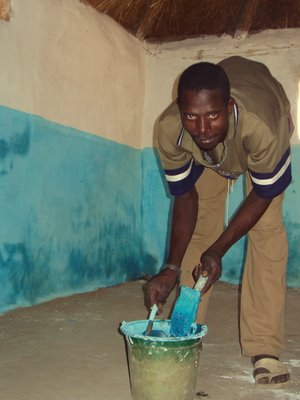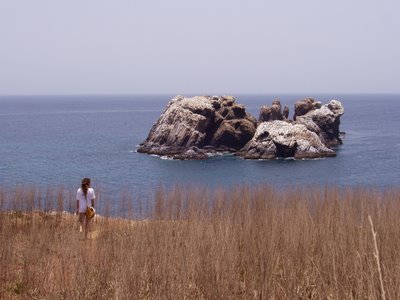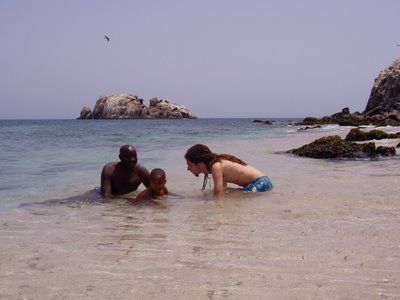As the sun creeps over the horizon, a tacit crack of the whip jolts the women from their slumber. My eyes struggle open, but only long enough to notice the commotion. I quickly drift back to an impenetrable sleep, until menacing rays engulf the small hut where I lay.

I step out to the courtyard where there is a frenzy of activity. The women and children have long since started the day’s chores. Kiné, Ousmane’s first wife, is feeding wood under the cauldron to finish cooking the mooni. It is the morning dish… mill flour rolled into little balls, cooked slowly with water resulting in a stew of grey guck. At some point they add an inordinate amount of sugar, maybe to trick kids into eating it.
Syra, the eldest daughter (12 yrs old), and her cousin Khadi are already glistening in sweat, neck muscles fiercely flexed as they carry what might be their 7th or 8th round of water towards the stock of immense clay jars. Two or three are kept in the wash area of each of the four huts that serve as sleeping quarters. There is also a 4 foot metal barrel for cooking and drinking needs. The younger girls are busy sweeping the rooms and courtyard and watching over the troop of toddlers running about.

As soon as Fatou spots me, she precipitately starts some coals and hunts down the teapot. At the AFVP case, Mady is responsible for putting out baguette and coffee for guests. I suppose Fatou wants to show me the same courtesy. “Liliane, voilà café… viens manger!”. She has also managed to find me a piece of bread. Though doughy with a distinct flavor of dirt, I was impressed (and grateful) knowing that it was baked without electricity or fuel.
Still sleepy and lost in the cackling of Mandingue morning chatter, I sip my coffee in silence. Soon after, Kiné comes in with a big bowl of mooni. “Lekkel, Lekkel!” (Eat, eat! wolof) I try not to grimace as I soup out my first bite. Meanwhile, the other girls are devouring the puddle of grey goop by large spoonfuls. I’m watched like a hawk,
“ Lekkel! il faut bien manger!” the women yell in unison. (Eat! you must eat well! french)
“Woaw, lekkna bubar!” (Yes, I eat well! wolof)
“No, no Liliane, il faut BIEN manger!”
The exchange would repeat itself at least 3 times … It was the only phrase they knew in French. And the routine would go down, every single time we’d eat. Who knew it was possible to be more exigent than Italian ladies!
Our rounds visiting family and friends began early. Fatou tried to explain who was who, but with half the village being related, I quickly lost track. We received a kind welcome in every hut. Even though I couldn’t understand what was said, I was warmed by their smiles and laughter. The reason for our village tour was also so that we could present the wedding gifts to the family… executed in very specific order. First we went to see their (super old) father, then to the eldest uncle’s compound, then to the eldest brother’s home and finally to the mother’s hut. Each time, Fatou listed the items and the amount of the cash contribution. They’d touch the dresses… hold the sheets and then jet off into a 7 minute benediction. After each phrase, Fatou looked down and tapped her forehead, repeating “amin, amin, amin…” (Amen). They were genuinely moved by my participation in the gift giving. I thanked them in turn for inviting me to share such a special event with their family and for being so well taken care of.
There is just no way to explain the spirit of “taranga” (hospitality) in Senegal. You have to experience it. It is unreal to what extent they’ll go to take care of their guests. Mady says, “When a visitor comes, they feel so proud… that the person took their time and spent money to make the voyage.” Even in a family of 5 with only one bed, they’ll insist on sleeping on the ground so that the guest will sleep comfortably. “It’s a big honor for Fatou to have you come along with her... a toubab, coming to Kissang?! uhp, bup bup bup!”. (Senegalese version of ‘woohweeeh!’)
As I’ve touched on before, food is at the heart of taranga. Each time we went into a hut during lunch hours, we were made to eat. Unfortunately, I did not know this until after I had stuffed myself with those who first insisted we share in their meal. Man oh man, mafé three times, served extra spicy and piping hot, whilst the temperature outside climbed into the hundred plus range. The worst part was I had forgotten to bring my bottle of water along, making each fiery bite that much more painful. I had decided to bring my own supply to Kissang after being advised that drinking village water could make me ill. When we finally got back to the home hut I guzzled down a 1.5 liter jug… despite it having turned hot! The entire time in the village, I’d long for a fresh cup drawn out of one of the cool clay jars.
After hydrating myself, I noticed Ousmane had the mattress brought out again so I could rest in the courtyard. He, on the other hand, was busy at work, painting the new bride’s bedroom a shade of bright blue. Curious, I asked him,
“So, how does it work? How do you divvy up the nights?”
“Two nights one wife will sleep with me and then two nights the other”.
Ousmane’s living quarters are in the middle, a door on both sides connecting to each wife’s wash area with a door to their rooms. The children stay in their mother’s hut.
While relaxing in the courtyard, a great many passersby stopped to chat. After a morning and afternoon of constant Mandingue, I was thrilled when a man named Khalifa addressed me in perfect French. He presented himself as a long-time friend of Mady. Within minutes we had plunged into discussions on American culture and politics, French immigration and the woman’s role in Senegal. Without any prompting, he shared his disapproval for the inequality of the workload between the men and women. “The differences are even more exaggerated in small villages like Kissang” he says, “granted, the men can’t cultivate anything during the 6 month long dry season, but they could AT LEAST help gather wood in the fields for their wives! My wife never goes out to get her own wood”. I agreed that it was rather disturbing to watch the women and girls toil while the men rest in the shade, playing cards and sipping tea.

Folks from the village stop in and chat. The first thing the old man says to me in a proud voice, "You know, I was in Europe, I fought with the French!"
-
Ousmane brought me into his future bride’s hut to show me the finished fresh coat of paint. His body pouring sweat, I comment, “whew, you must be glad to be done!”. “Oh no, I’m not done…” He signals over to wife number one’s hut, where a friend has already started carrying out the furniture. I couldn’t help but to laugh, “oh yeah, the wives treated equally thing…”
 Ousmane painting the bride's room in what looks to be home-made paint.
Ousmane painting the bride's room in what looks to be home-made paint.

As siesta hour came to a close, children had once again gathered in a circle outside the compound singing and beating on their home-made drums. Before venturing out, I spent 15 minutes on my mattress tapping my feet, trying to figure out how the heck I’d get my toubab body into the vibe. Eventually, I decided the best thing to do was just to jump in and go for it. I took my place in the circle, watching 5 year olds wildly move their little limbs in perfect synchronization. It wasn’t long before the “il faut danser” chant began. Taking a deep breathe, I jumped in the middle doing my best to imitate the dancers before me. My 4 minutes of toubab boogie ended in a barrel of laughs… but also with an encouraging, “merci, merci, c’est bien!”

I didn’t last long in the hot sun before wanting to return to my mattress in the shade. The children, ecstatic and still in complete fascination with their toubab visitor, followed me inside, reforming their circle where I sat. A young girl began singing the verses to a song to which everyone knew the chorus. I was amazed at the power in her voice… a 6-year old, singing with the grace and confidence of an old woman, already carrying with her a life-time collection of hymns. At one point, she even modified one of the songs and put in my name. I was touched by how easily the children found a source of joy in clapping, singing and dancing.
 I was curiously watched by young villagers at all times.
I was curiously watched by young villagers at all times.
In the early evening, I decided to make my way out to the water tower. Khalifa had informed me that if I climbed to the top, I might be able to get a signal and make a call. Eager to let my sweetie know that I had arrived safely, I asked Fatou to bring me there. As we went along, villagers stopped us to inquire where we were headed. When Fatou told them I was going to climb the water tower, first their eyes got real big and then they dropped what they were doing to join us. By the time I got to the ladder, at least 30 people had gathered, all in complete disbelief that I’d go up so high. Apparently no one in the village had ever dared. They watched me in complete silence until I got to the top and waved down below to let everyone know I was o.k. And yes, I did get a signal and did get to talk to my honey.

View taken from top of water tower. The village extends past the trees.
 The villagers take turns filling their buckets with water. Don't let the young man fool you, he is holding an empty bucket to take part in the picture. I never once saw a male carrying water.
The villagers take turns filling their buckets with water. Don't let the young man fool you, he is holding an empty bucket to take part in the picture. I never once saw a male carrying water. -
Back at the hut, I was told water was ready for my evening rinse. In Kissang you shower two or three times a day. The women wash up after their long morning session of chores, in the midday if they’ve gotten real sweaty while cleaning and in the evening after they have finished preparing dinner. And can you guess what we had for dinner? Mafé maybe?! Yep.
After eating too much, Fatou took me with her to spend time with her sister. We crossed the village under a sky of a million stars. Over the course of our visit however, the moon’s ascension transformed the scenery with its magnificent glow… meanwhile, we could hear the sound of approaching drums. “Ahhh… the griots have arrived! They were in the bride’s village yesterday and tonight Kissang will dance!” Griots have a very special place in society. They are responsible for passing down the oral histories of the families, usually in the form of song. They also lead the music in all the drum circles. In Kissang, the Thiatchi family are the griots. The little girl I spoke of earlier is a young Thiatchi.
Completely mesmerized by the thundering of drums, I couldn not look away from the direction from which they were coming. It didn’t take long for the ladies to get the hint that I really wanted to go check it out. “Ah Liliane, tu veux danser?” As we approached, I realized the whole village was participating. I immediately renounced the possibility of entering the dance circle. Rather, I hid in the back, climbing up on a pile of wood to try to see what was going on. The Senegalese are so dang tall! Honestly, the children I’d seen dance earlier in the day were just as good as the adults… but the drum beats, my goodness, were just incredible. I stood there, dumbfounded, until the ladies were ready to call it a night.



















